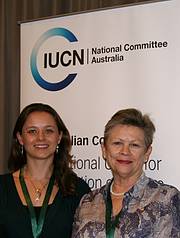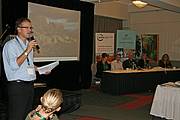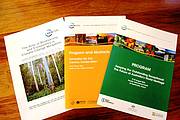Australian National Committee of IUCN Members
01 August 2012 | Article
The Australian Committee for IUCN (ACIUCN) has undergone major changes in the last four years after members decided to invest in its revitalisation in 2009. In December 2010 Penelope Figgis, the Vice Chair Oceania of the IUCN World Commission was appointed to the new position of Director. Since then ACIUCN has become a significant contributor to environment policy in Australia and enhanced the overall positioning of IUCN in Australia.
Organisational
- The Constitution was completely revised in the first 3 months of office.
- The organisation has reached out to all Commissions and generated a more comprehensive list of contacts. Communication with members/Commissions is now regular and avoids duplication of Geneva generated posts.
- Members get prompt minutes from all meetings and detailed reports twice a year.
- Funding from dues has been augmented by direct grants, substantial contributions in kind for meetings and by the mobilisation of research assistance for symposia and voluntary meeting helpers and recorders.
- A comprehensive list of potential new members has been compiled and invitations sent. This has resulted in a number of requests for Associate status.
Events
- In June 2011 we inaugurated the ACIUCN ‘Science informing Policy’ Symposia. We held our first Biodiversity and Ecosystems in Climate Change Mitigation in partnership with the Australian National University. With over 60 high level participants it was regarded as very successful. We generated a summary publication which was distributed at an important point in the carbon and biodiversity debate to over 80 parliamentarians.
- In August 2011 ACIUCN hosted the IUCN Oceania Regional Forum in Brisbane. With over 105 delegates this was the largest meeting of IUCN components in our region for many years. It was an immense task but it was regarded as well organised and productive meeting which gave a picture of IUCN activity across the region and was an important preparatory meeting for the IUCN Congress.
- The Ordinary Meeting and AGM were held on 8th November in Sydney with good attendance and participation. This meeting endorsed goals for 2012.
- In March 2012 we held the second symposium Innovation for 21st Century Conservation on new partnerships and mechanisms for achieving conservation at scale in Adelaide. Our partners were the South Australian Department of Environment and Natural Resources and The Nature Conservancy. It attracted over 80 delegates and had excellent feedback for both its content and networking value. We are currently completing a publication from the symposium which is part funded by the Commonwealth Department of Environment (DSEWPaC).
- The third in the symposia series, Keeping the Outstanding Exceptional - World Heritage in Australia was held on August 9-10th in Cairns. Our key partners were the Wet Tropics Management Authority and Australian Conservation Foundation. The symposium attracted over 100 delegates from all over Australia and generated a research report, a Communique and will generate a publication based on papers presented.
- In 2013 we are planning new symposia on marine conservation and social engagement for conservation.
Representations
- ACIUCN has made representations to Australian governments on Climate Change Legislation, Biodiversity and Carbon fund, the National Wildlife Corridors, endangered Grey Nurse sharks, NSW Marine Conservation and protection of the Coral Sea, the integrity of the national environment and biodiversity laws and national marine declarations.
- ACIUCN has taken a significant role in the issues surrounding the concerns raised by the World Heritage Committee in mid-2011 regarding infrastructure impacts on the Great Barrier Reef World Heritage Area. ACIUCN formed an expert group from IUCN Members and Commissions chaired by Prof. Richard Kenchington. The group compiled a briefing paper which was circulated to members and which was used to brief the monitoring mission and to inform discussions with Commonwealth officials. ACIUCN convened the main NGO meeting in Sydney.





